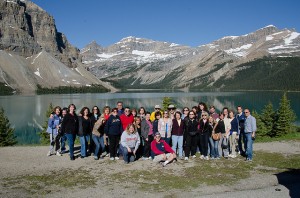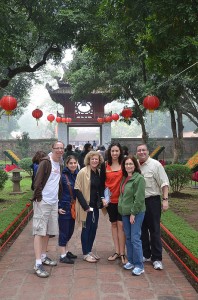As we begin the festive holiday of Hanukkah tonight, we embark on a tradition that’s thousands of years in the making. As Jews in the 21st century, we have been made aware of the candle lighting customs…the spinning of dreidles…the giving of gifts…and the eating of sufganiyot (jelly donuts). But that’s here, in America. What about other parts of the world? Is our tradition varied at all by culture, geography or even political climate?
I’ve been to Shabbat Services all around the world; from Australia to Costa Rica…Argentina, Croatia, England and even Russia. What I’ve noticed is that as people we are all so different…..yet as Jews, we are all so much the same. I may have (tried to) read the non-Hebrew portions in Spanish, Croatian or Russian, but when it came to the traditional prayers read in Hebrew, it was as familiar to me as my Gates Of Prayer. The Sh’ma, Shalom Aleyhem, Lecha Dodi and others….all just the same as mine back home.
But I digress. Hanukkah. One would think that this meaningful, yet rather easily understood holiday would be celebrated just as simply around the world. You light candles, sing songs, spin dreidles and eat latkes & donuts. How much variation could there be? Well, see the stories below for a “wow” on just how different Hanukkah can be:
Spanish Jews hold first Hanukkah in five centuries –
The Jewish community of Spain held a public celebration of Hanukkah Dec. 20, 1998, for the first time in more than five centuries. Members of the small community lit candles at the same location in Girona, Spain, where their ancestors sought protection in 1391 from anti-Semitic violence that was prevalent at the time. Jews were expelled from Spain in 1492. “This is an emotional and unforgettable day,” Mayor Joaquim Nadal told the gathering outside the ruins of Gironella Tower. The candle-lighting ritual on the eighth and last day of Hanukkah drew close to 1,000 people, including many non-Jews. The ceremony was lead by Eliahu Bakshi Doron, Israel’s chief rabbi of Sephardic Jews, who trace their ancestry to Spain.
A Jew in Japan (trying to) celebrate Hanukkah – One thing that I do every year at this time is decorate my English school with Hanukkah memorabilia. Near the entryway, I put out a hanukiyah . On the table in the lobby, I laid out a number of dreidels. The walls are decorated with posters of children eating latkes and sufganiyot playing with dreidels, and, of course, lighting hanukiyah.
The yearly display always draws a big response because it is unfamiliar to Japanese people (many American people, too, I imagine). Kids love to play with the dreidels (tops are a popular New Year`s activity in Japan). Young and old admire the candles displayed in the hanukiyah. And, invariably, several people say, “I didn`t know that people in America celebrated Christmas like this!” Oy Vey! One student even looked at a picture of Judas Macabbee and said, “I thought Santa Claus always wore red!”
MEXICO – In Mexico Hanukkah is written “Januca,”. The Jewish Hanukkah customs are very similar to those of Jews elsewhere except that the food may be a little different. Instead of latkes and sufganiot which are common among the Ashkenazic Jews of Russia and Eastern Europe the Sephardic Jews of Mexico tend to favor things like “buñuelos” which are fried fritters drenched in sugar syrup and also balls of corn dough with marmalade inside. Like their Jewish counterparts around the world they play the game of “dreidel” which they call “toma todo” and they call the dreidel top a “pirinola”. To make their holiday really special and authentically Mexican the add a Mexican “piñata” in the shape of the dreidel top to the festivities.
Today, there are about 50,000 Jews living freely in Mexico and openly practicing their ancient religion. I hope they all enjoy their Hanukka festival. Happy Hanukka to everyone!!!
The Light of Hanukkah Menorahs shall Shine all over Russia – This year, despite the global crisis, the light of Hanukkah candles will shine not only for kids, but, for all Jews across Russia. In the outgoing year, as never before, Jews had the support and understanding of the government. For us, this support is very important, and we are pleased that the Russian government shows its support for all the traditional religious confessions, in particular, for its care for our Jewish community.
Without this support, the full-blooded rebirth of Jewish life in Russia would have been impossible. Firstly, the state returned to us many buildings that were owned by the Jewish community before the Revolution. Today, the government actively cooperates with the Jewish community in tackling social problems. Recently, our community won one of the support grants for non-commercial organisations. With God’s guidance, we will use it to implement our plans in the incoming year. Generally speaking, without the involvement on the part of the state, the Jewish community would have been unable to achieve the successes it has achieved in the sphere of education, enlightenment, and religious life”.
Eight days of Hanukkah celebrations will take place throughout the entire country. During these days, in Moscow, there will be holiday concerts, fairs, and music and arts festivals, which shall bring together ensembles and performers from many Russian regions, Israel, and Jewish communities around the world.




















